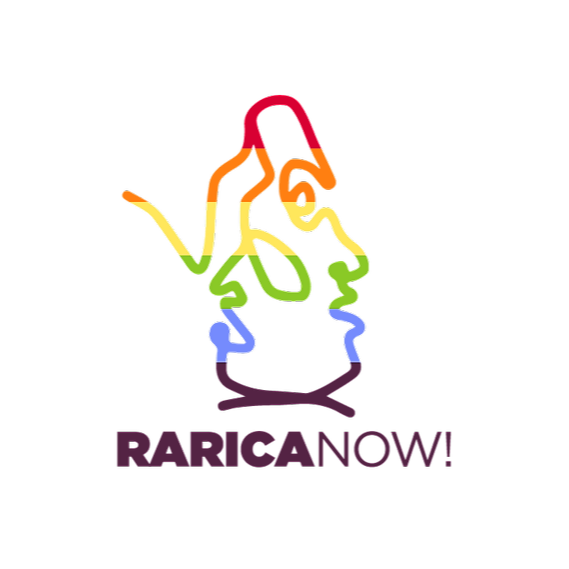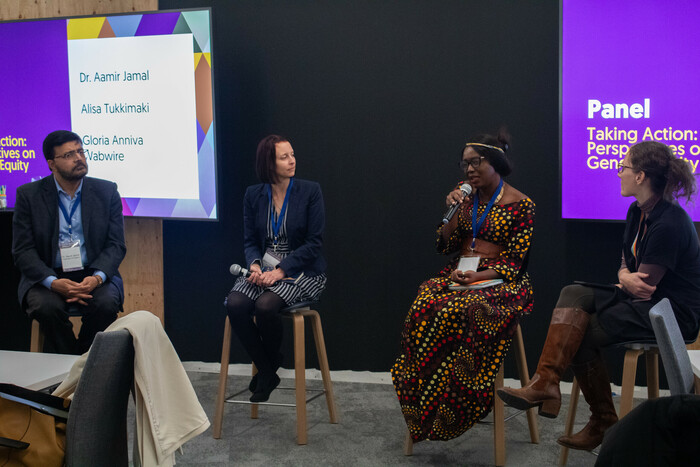Albertans Combating Gender Inequality: Rarica Now
“Our freedom is non-negotiable. Our joy is non-negotiable.” - Adebayo Katiiti

Image: Rarica Now logo
----
This is the final entry in ACGC’s series on Albertans combating gender inequality at home and around the world. Featured here is Adebayo Katiiti, founder and CEO of Rarica Now, a non-profit organization that promotes human rights for all 2SLGBTQIA+ refugees and newcomers to Canada. The organization also leverages service provisions to address the refugees' needs and continues promoting conversations in the same area of focus, sharing triumphs and focusing on being part of institutions rectifying their struggles through political, social, economic and cultural means. Rarica Now works extensively with newcomers and refugees to Alberta.
Disclaimer: Details and quotes below are taken directly from the interview with Adebayo, unless otherwise noted.
About Rarica Now
Rarica Now’s vision is for a world where all persons, especially transgender refugees, have support, feel safe, are empowered, and are able to live with dignity. Rarica Now’s mission is to coordinate, collaborate and build a social justice movement that will leverage transgender refugees' agency and autonomy at a local, provincial, national and international level--all the while enhancing collective capacity to advocate for all 2SLGBTQIA+ refugees and people of colour’s rights and access to basic services. The organization promotes equal rights, awareness, education, advocacy, and access to culturally relevant support and services for transgender, queer, and gay refugees. Rarica Now values equity, integrity, humanity, social justice for all--and especially for the transgender community.
Rarica Now was founded on May 15th, 2017 by Adebayo Katiiti, a transgender athlete and activist, who came to Edmonton from Uganda for the ILGA swimming competition. Adebayo could not go back home because of fear of being persecuted by Uganda’s Police Force after police raided a gay pride event. He was among the people who were arrested, and he was discriminated against by his own family as they discovered that he is a transgender man. Adebayo applied for refugee status in Canada to save his life and is currently a permanent resident. Since his arrival, he has dedicated his life to advocating for 2SLGBTQIA+ refugees. His work includes organizing campaigns, stopping deportations, finding support for settlement, and building a strong and powerful community for 2SLGBTQIA+ refugees. He passionately continues to share his story and experience amidst the threats from white supremacists who have targeted him. As a Black, transgender man from Uganda, co-founding an organization like Rarica Now was a no-brainer for Adebayo. A self-proclaimed rebel, Adebayo never kept his identity a secret, even if he was met with violence. Being a part of the 2SLGBTQIA+ community was, and still is, illegal in Uganda, which resulted in him being disowned by his family at the age of 21.
His lived experience and compassion for the community is at the heart of his work: “We are family. If you walk into Rarica Now, you will see that we take care of each other,” says Adebayo. Understanding intersecting identities is key to Rarica Now’s work. Those who are involved with Rarica Now have similar lived experiences and are uniquely equipped to support other 2SLGBTQIA+ newcomers and refugees. Rarica Now aids newcomers and refugees, in many ways, including guiding them through the asylum process and organizing supporting documents. They also help to combat food insecurity and mental health challenges. Rarica Now just started planning a housing initiative and are in the midst of talking to partners, including the City of Edmonton. Adebayo describes these conversations as “so, so, so welcoming.” In addition, Rarica Now advocates for transgender criminal justice and healthcare. Besides human rights, antiracism, and advocacy work, Rarica Now hosts several events highlighting the importance of joy (more on that to come later in this story). For a comprehensive list of Rarica Now’s activities, please visit here.

Image: Rarica Now's Executive Director, Gloria Anniva, speaking as a panelist at ACGC's 2023 Annual Conference.
----
“We are a Black-led 2SLGBTQIA+ organization in Alberta”, and the amount of systemic racism, homophobia, and transphobia that 2SLGBTQIA+ newcomers and refugees, as well as Rarica Now, face, is undeniable. But despite all the adversity, “we create what was never created for us”, says Adebayo. Adebayo has found a true welcome in the Indigenous communities who have nurtured, healed, shared wisdom, and provided a home to 2SLGBTQIA+ newcomers and refugees. He explains: “If there wasn’t any community, Rarica Now wouldn’t be where it is right now.” This is one of the greatest honours for him, as “that is what has taken us this far.” Adebayo also credits the local and global 2SLGBTQIA+ community who have taken risks for Rarica Now to exist and are truly a family. It is clear that community is a driving force in the work that Rarica Now does.
Very recently, Rarica Now was named “Centre of the Year” by the Enchanté Network, the largest 2SLGBTQIA+ network in Canada. Adebayo is incredibly grateful for the recognition and says it serves as motivation to continue, saying, “This is the time. The world is watching. I don’t have to keep hiding what my community has done.”
What can Albertans do?
“No act of gratitude is ever wasted, as it has the potential to create a positive impact on ourselves and the world. So let us embrace the practice of gratitude and spread its transformative power far and wide.” - Adebayo Katiiti
Adebayo urges intentionality when protecting and supporting Black 2SLGBTQIA+ spaces, saying that “the trans community is under attack, and when the trans community is under attack, who do they come for first? The Black trans community.” Fighting for rights and freedoms is incredibly painful, and ongoing, but what Adebayo really wants is for Albertans to know that despite the fight, Black 2SLGBTQIA+ folks are filled with joy. Joy is not an area of compromise for Adebayo, as “this time around, we are reclaiming our power, we are living our lives freely.” It is imperative for Albertans to understand this before providing any other type of support.
There are several ways that individuals in Alberta can support 2SLGBTQ+ refugees:
- Education: Consider training with Rarica Now and taking the time to learn about the unique challenges and experiences faced by 2SLGBTIQ+ refugees. Understanding their specific needs and the issues they may encounter will help you provide more effective support.
- Volunteer with Rarica Now and other allied organizations: Share your skill and expertise; many organizations in Alberta work directly with 2SLGBTIQ+ refugees and provide various services such as settlement assistance, language support, and mental health resources. Consider volunteering your time and skills to support these organizations and their initiatives.
- Donate: Financial contributions can make a significant impact on the work being done to support 2SLGBTIQ+ refugees. Rarica Now welcomes donations of money or items such as clothing, culturally appropriate non-perishable foods, or bus tickets for newcomers, especially heading into winter. Programs, such as Meet & Greets, allow newcomers to share their stories safely and are also welcome. Above all, “let’s connect at a level of seeing each other and meeting everyone where they are at.”
- Offer Housing or Support: If you have the means and capacity, consider offering temporary housing or support to 2SLGBTIQ+ refugees. This can provide them with a safe and welcoming environment as they navigate their new lives in Alberta.
- Advocate for 2SLGBTIQ+ Rights: Use your voice to advocate for 2SLGBTIQ+ rights and Black trans and queer inclusion in your community. Support policies and initiatives that promote equality and work towards creating a more inclusive society for all, including 2SLGBTIQ+ refugees. It's important to approach this work with cultural sensitivity and respect for the unique experiences of 2SLGBTIQ+ refugees.
Rarica Now exists to address the gaps in the system and provide access to resources, with a specific focus on centering the experiences of the Black 2SLGBTIQ+ community that is often marginalized. To learn more, please watch the brilliant documentary, Along Road to Peace.